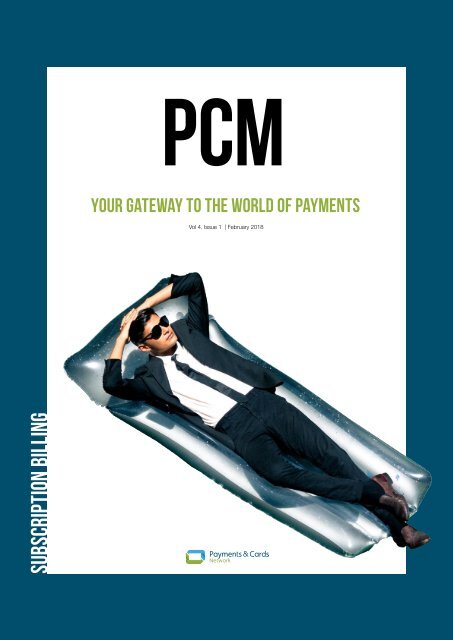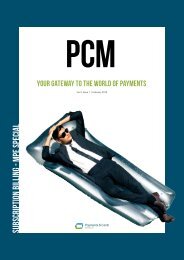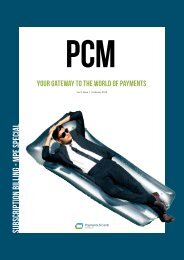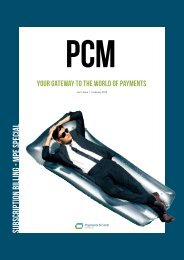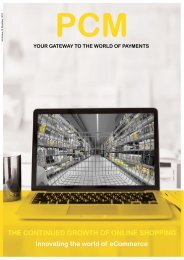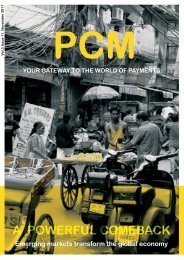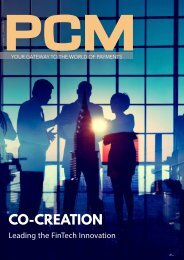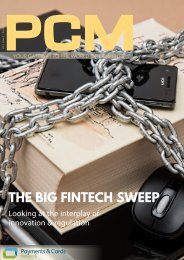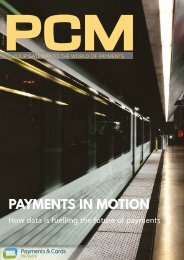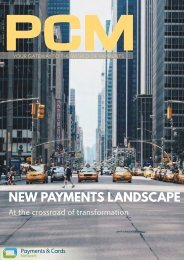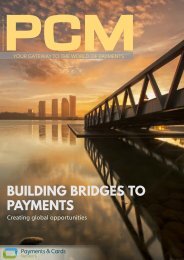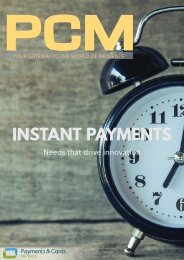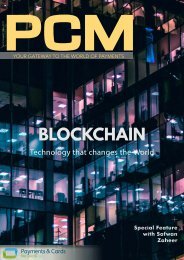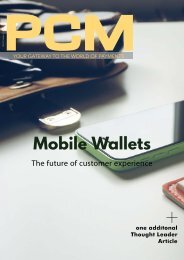PCM_issue4vol1_3.version..
You also want an ePaper? Increase the reach of your titles
YUMPU automatically turns print PDFs into web optimized ePapers that Google loves.
<strong>PCM</strong><br />
YOUR GATEWAY TO THE WORLD OF PAYMENTS<br />
Vol 4. Issue 1 | February 2018<br />
SUBSCRIPTION BILLING
CONTENTS<br />
4<br />
8<br />
12<br />
14<br />
16<br />
20<br />
21<br />
2018: A Seminal Year for the Future of<br />
Payments?<br />
merchants and billing services<br />
startup spotlight: commerce signals<br />
Increase Your eCommerce sales with a<br />
successful payment page<br />
access point Financial Poised for Growth<br />
hot jobs<br />
industry events<br />
BLANKA LIGETI<br />
Production Editor & Head of Creative<br />
blanka@teampcn.com<br />
JESSIE RANDHAWA<br />
Editor<br />
jessie@teampcn.com<br />
THANKS TO OUR PARTNERS!<br />
<strong>PCM</strong> is designed by Blanka Ligeti, Payments & Cards Network. Art and photos © Payments & Cards Network, picjumbo.com, Flickr.com and Shutterstock.com, excluding advertisments and company logos.<br />
<strong>PCM</strong> is property of Payments & Cards Network, Herengracht 576, 2nd Fl., 1017 CJ, Amsterdam, The Netherlands. All material contained within <strong>PCM</strong> is the property of Payments & Cards Network. All<br />
other product and service names may be trademarks of their respective companies. ©2017 Payments & Cards Network. All rights reserved. Reproduction of any kind is strictly prohibited without express<br />
prior written consent of Payments & Cards Network.<br />
ADVERTISING INFORMATION<br />
For details, please contact amir@teampcn.com<br />
www.payment.jobs<br />
www.academy.teampcn.com
2018: A SEMINAL YEAR FOR THE FUTURE OF PAYMENTS?<br />
by Matthias Setzer<br />
The payments industry is in a constant state of<br />
transformation. Long gone are the days when it was<br />
dominated by innovation in cards and terminals.<br />
It is – quite expectedly – now under the influence<br />
of digitalisation. Technology companies, fintechs,<br />
untraditional currencies and banking models are<br />
pushing the drive towards a more sophisticated,<br />
decentralised, customer- and security-driven approach<br />
in what was once considered a straight-forward<br />
industry: payments. This revolution has been hailed as<br />
golden among analysts and investors, with its appeal<br />
to put security and users at the centre, amid growing<br />
consumer demands and expectations.<br />
With so many developments ahead, one would wonder<br />
- what’s the ultimate goal of this transformation? Is it<br />
to fully digitalise an industry that still runs virtually on<br />
cash? Is it to facilitate P2P, P2B or B2B2C payments?<br />
Or is it to simply ensure that eventually, everyone,<br />
everywhere, will be able to make and accept payments<br />
when (and how) they like? Looking at the latest figures<br />
by The World Bank, the latter presents a massive<br />
challenge. It’s almost universal for consumers in highincome<br />
economies to have a bank account and use<br />
it at least three times a week for online and offline<br />
payments (94%). Still, only slightly more than half of<br />
all adults in developing economies have access to the<br />
same convenience in payments.<br />
With so many important developments unfolding this<br />
year, 2018 is shaping up to be a seminal year for the<br />
payments and fintech industry. Here’s a look at what’s<br />
ahead:<br />
Regulations will define the pace<br />
This year is all about compliance and requested<br />
permission and nowhere is the hype more prevalent so<br />
than in Europe.<br />
While tech giants are taking precautions to ensure they<br />
comply with strict new policies, especially as the EU’s<br />
General Data Protection Regulation comes in effect this<br />
May, the payments and fintech industry has its eye on<br />
PSD2. As of January 13, 2018, the Revised Payment<br />
Services Directive (PSD2) is in fact in place.<br />
In short, PSD2 mandates the use of open APIs, allowing<br />
financial transaction information to be shared with<br />
explicit permission from the account holder.<br />
What’s interesting to explore is that PSD2’s mandate<br />
carries a hidden opportunity – it’s a chance for banks<br />
and traditional financial institutions to co-operate with<br />
fintechs, rather than see them as potential threats.<br />
Built with security and customer protection at their<br />
core, fintechs have the ability to facilitate the struggles<br />
banks have when adapting to PSD2, as they’re already<br />
leading the way with the latest security components<br />
such as tokenization in place.<br />
Tokenization came to exist as a way to encourage<br />
fraud prevention; it’s where payment credentials are<br />
tokenized to ensure the uselessness of data should it<br />
happen to fall into the wrong hands. One of the ways<br />
in which tokenization is already shaping the year is the<br />
impact that it has as a fraud reduction measure and<br />
the ability it has to improve the user experience. As<br />
more consumers make mobile purchases, tokenization<br />
enabling one-tap payments is creating a new way to<br />
pay online.<br />
It’s All About Customer Experience – It always has<br />
been, actually!<br />
Ask any business owner about their main business goal,<br />
and they will wholeheartedly say that nothing comes<br />
close to ensuring a high level of customer retention.<br />
4<br />
4 THOUGHT LEADERS CORNER
No matter the type of merchant – online or offline,<br />
B2B or B2C, every business is working on controlling<br />
and reducing churn to ensure a stable customer base<br />
and predictable cash inflow. This task can become a<br />
challenge of massive proportions if the business model<br />
of this merchant is based on recurring payments. And<br />
why is that?<br />
Recurring payments are a win-win for both sides as<br />
they allow consumers to easily and effortlessly plan<br />
their expenses, and in return help merchants smooth<br />
out their revenue stream and ensure long life-cycles.<br />
Moreover, as reported by The Economist Intelligence<br />
Unit, consumer demand for new consumption models<br />
– subscriptions, sharing or leasing - is hitting the roof<br />
at over 85%. In a world where online purchases for<br />
goods and services are dominating, businesses have<br />
to find ways to ensure seamless online purchasing<br />
experiences. With that in mind, offering recurring<br />
payments and subscription options can help lead the<br />
way to a necessary change.<br />
Moreover, the advent and uptake of eCommerce also<br />
means cross-border sales now represents one of the<br />
biggest opportunities available to merchants around<br />
the globe. With the accelerating shift to subscription/<br />
new consumption models, companies who want to<br />
grow their business or remain leaders in their industries<br />
will increasingly explore cross-border opportunities,<br />
especially in high-growth markets such as LATAM and<br />
India.<br />
A pressing issue to take into consideration is involuntary<br />
churn: a worry for any subscription-based business.<br />
What is specific for high growth markets is that when<br />
we look into a terminated subscription because of a<br />
payment issue in those markets, the problem does not<br />
only come in the form of fraud, expired or lost cards.<br />
In some cases, subscriptions could be cancelled and<br />
payments could not be going through if the preferred<br />
method of payment of customers is not supported by the<br />
merchant, resulting in unnecessary cancellation, even<br />
if the consumer might still want the product or service.<br />
Merchants should ensure their payment processor can<br />
offer a strong solution for subscription business models.<br />
MATTHIAS SETZER<br />
Chief Commercial Officer at PayU<br />
Matthias joined PayU as the Chief Commercial<br />
Officer in October 2016. In this role he is<br />
responsible for PayU’s cross-border business,<br />
global sales, key accounts, strategic<br />
partnerships and marketing & PR. Before<br />
joining PayU, he worked with PayPal for over<br />
12 years in various roles, most recently as<br />
their Senior Director Strategic Partnerships &<br />
Biz Development EMEA, based in Luxembourg.<br />
Matthias holds a Masters degree from WHU in<br />
Vallendar, Germany.<br />
PAYU<br />
PayU uses its payments heritage and expertise<br />
to deliver financial services in emerging<br />
markets. Our local operations in Asia, Central<br />
and Eastern Europe, Latin America, the Middle<br />
East and Africa enable us to be experts in these<br />
countries and provide the best solutions for<br />
the local market. PayU is the leading online<br />
payment service provider in 16 high growth<br />
markets, dedicated to creating a fast, simple<br />
and efficient payment process for merchants<br />
and buyers. Our 250+ payment methods and<br />
PCI certified platforms are designed to meet<br />
every consumer’s needs. The markets in which<br />
PayU operates represent a potential consumer<br />
base of nearly 2.3 billion people and a huge<br />
growth potential for merchants. PayU has more<br />
than 1,800 payment specialists based in these<br />
local markets supporting PayU’s 300,000+<br />
merchants and the millions of consumers<br />
making online payments.<br />
5
What else is on the line?<br />
Mobile payments<br />
The growth of mCommerce will also influence the<br />
increase of mobile payment methods and wallets. This<br />
trend is supported by the increase in consumer habits<br />
of using multiple devices in their path-to-purchase –<br />
using their desktop when gathering information about<br />
a product or service, followed up by an offline visit to a<br />
shop, and finalisation of the deal via a mobile app.<br />
Need for Payment Services to Talk to One Another<br />
Looking at the rise of mobile payments, we will also<br />
see the need for payment services and platforms to<br />
communicate to one another in a synced, frictionless<br />
way. Use of open, third-party APIs for payments<br />
will become a trend, with fintechs, merchants and<br />
technology companies collaborating to deliver smooth<br />
customer experience.<br />
Blockchain<br />
Blockchain has been raised to dizzying heights as<br />
predictions claim that the decentralized database will<br />
alter technology as we know it.<br />
Moreover, both financial services and payments, two<br />
of the most complex and highly regulated industries<br />
in the world, are under the strong influence of the<br />
developments of blockchain and distributed ledger<br />
technologies. Distributed ledger technology, first<br />
showcased through the Bitcoin cryptocurrency network,<br />
has the potential to redefine the complex pipelines that<br />
make payments possible. In the coming months, we<br />
will certainly see a lot more clashes between banks<br />
and DTL technologies in addressing customer needs.<br />
We will also see an increase in use of blockchain<br />
technologies for clearing and settlements, as well as<br />
seamless, intermediary-free, peer-to-peer transactions<br />
that correspond to data privacy requirements.<br />
Conclusion<br />
Digitalization is reshaping payments at a rapid pace.<br />
The implications of this changing landscape require<br />
a more agile, customer- and data-centred approach.<br />
Whether it is by rethinking the business models to offer<br />
more attractive and worry-free payment plans; by<br />
complying with regulations that ensure data privacy<br />
is top priority, or by building payment systems that<br />
correspond with the ways consumers behave, 2018 is<br />
shaping up to be the year that puts customers’ specific<br />
needs behind the wheel to drive the payments industry.<br />
6<br />
THOUGHT LEADERS CORNER
7
MERCHANTS AND BILLING SERVICES<br />
<strong>PCM</strong>: What challenges do merchants managing<br />
subscription billing have that typical merchants<br />
don’t have to face?<br />
Roney: In general, merchants that provide subscription<br />
billing have to handle challenges like managing failed<br />
transactions, keeping customer payment details<br />
updated, upgrading and downgrading service packages,<br />
handling the combination of discounts of subscriptionbased<br />
programs with regular purchases from the same<br />
customer, and specially for merchants that operate over<br />
multiple locations with different currencies, managing<br />
exchange rates and applying the correct price.<br />
If those challenges by themselves were not enough,<br />
customer awareness on the importance of online security<br />
is constantly increasing. Therefore, whenever storing<br />
payment data<br />
from a customer,<br />
merchants need<br />
not only to comply<br />
with regulatory<br />
requirements,<br />
but most importantly,<br />
provide<br />
such assurance to<br />
the consumer as<br />
well.<br />
<strong>PCM</strong>: What are some interesting ways you have<br />
seen merchants overcome these challenges?<br />
Roney: The solutions for these challenges can be quite<br />
diverse, and they are facilitated by the flexibility that<br />
online environment offer.<br />
Sometimes, the solution for these issues can be even<br />
facilitated by services that are offered directly by the<br />
merchant’s payment service provider.<br />
Some payment service providers offer tokenization<br />
services that allow the merchant to replace the customer<br />
data (including card number) by a token.<br />
By having to store just this token, which is only useful<br />
and can only be processed by the payment service<br />
provider, the cybersecurity risks the merchant is subject<br />
to is significantly reduced. Another example of an<br />
interesting solution is the application of risk engines to<br />
determine whether or not a subscription service should<br />
be interrupted in case of a failed transactions.<br />
In case a credit card is “blocked” and replaced by a new<br />
one, the card on file information stored by the merchant<br />
will need to be updated. In case the consumer forgets to<br />
update this information the recurring payment will fail,<br />
what could lead to service interruption.<br />
As service interruption may lead the customer to<br />
question the continuation of the subscription, merchants<br />
are applying customer scoring techniques to choose<br />
whether or not allow the service continuation for a short<br />
timeframe to allow the customer to update the card<br />
details.<br />
<strong>PCM</strong>: How does EMVCo tokenisation being offered<br />
by the payment networks impact subscription<br />
billers?<br />
Roney: The service offered by the schemes can be<br />
really helpful to solve the problem I mentioned in the<br />
previous question, about outdated card on file details.<br />
Such services enable an issuing bank to inform that<br />
the original card number associated with a token<br />
needs to be updated. This can significantly reduce the<br />
amount of failed transactions due to outdated card<br />
on file information, as the tokenized information used<br />
for transaction initiation will no longer be linked to a<br />
blocked, cancelled or expired card.<br />
8<br />
EXPERT INTERVIEW
<strong>PCM</strong>: What are some of the new technologies you see<br />
coming up in the new year and how will they change<br />
the outlook for subscription billing merchants?<br />
Roney: There’s currently a lot going on in this space,<br />
but I believe it may be worth to mention two trends. The<br />
first one is 3D Secure 2.0. Although the first version of<br />
this protocol is usually associated with some criticism,<br />
this new version introduces new features like nonpayment<br />
use cases, which could be used for instance<br />
for authenticating card on file transactions or enabling<br />
card details to be used for future transactions. This<br />
authentication layer could represent less risk in this<br />
type of transactions which can potentially result in lower<br />
transaction fees.<br />
Next to that, the second trend is definitely the new<br />
possibilities introduced by PSD2 and the emerging<br />
payment initiation services. I expect that these services<br />
will pave the way for new methods of enabling<br />
subscription or recurring payments with increased<br />
customer authentication, oversight and management<br />
possibilities on its subscriptions.<br />
RONEY CASTRO<br />
Roney Castro is a Principal Consultant at<br />
UL’s Transaction Security division. He is<br />
responsible for knowledge development<br />
within the banking and payments domain<br />
and has extensive experience in Payments<br />
(EMV, Mobile and Cloud-Based) and<br />
Authentication and Identification related<br />
technologies such as Biometrics and<br />
secure documents.<br />
<strong>PCM</strong>: Are there any additional trends or themes you<br />
are seeing in subscription billing?<br />
Roney: Not directly related to subscription billing, but<br />
a trend that will impact this modality of payment is the<br />
growing number of connected smart devices and IoT.<br />
Merchants will need to be able to manage payments<br />
and orders that are triggered not necessarily involving<br />
a consumer action.<br />
For instance, smart devices that could detect products<br />
reaching their expiration could automatically trigger<br />
an order for new items. To manage this, merchants<br />
would need to enable a whole new set of features on<br />
the customer account level, and set new policies for<br />
consumer consent on such transactions. This is necessary<br />
as not only new challenges for subscription billing will<br />
be introduced, but also the challenges discussed in the<br />
previous questions will be amplified.<br />
UL TRANSACTION SECURITY DIVISION<br />
UL guides companies through the complex<br />
world of electronic transactions. UL is the<br />
global leader in safeguarding security,<br />
compliance, and global interoperability.<br />
Offering advice, training, compliance and<br />
interoperability services, security services,<br />
and UL Test Tools, during the full life cycle<br />
of your product development process or<br />
the implementation of new technologies.<br />
UL’s people proactively collaborate with<br />
industry players to define robust standards<br />
and policies. Bringing global expertise to<br />
your local needs.<br />
9
$<br />
$<br />
“ WE EXPECT MOST CLIENTS TO SEE IMPROVEMENTS IN SALES LIFT FROM 30%-150%<br />
BY USING COMMERCE SIGNALS AND ACTING ON THE NEAR-REAL TIME INSIGHTS.”<br />
<strong>PCM</strong>: Tell us about Commerce Signals. How did this<br />
idea come to be?<br />
Thomas Noyes, the founder of Commerce Signals,<br />
recognized that banks had incredibly powerful<br />
consumer behavior data in payments, but did not have<br />
a controlled and privacy centric way to share that data<br />
back with their merchants.<br />
<strong>PCM</strong>: Why is it called Commerce Signals?<br />
We leverage aggregate payment data to help retailers<br />
and restaurants know if their marketing is driving<br />
incremental sales.<br />
The payment data (Commerce) is the signal to the<br />
merchant that their marketing is working or where<br />
improvement is possible.<br />
<strong>PCM</strong>: Why is Commerce Signals needed?<br />
Many marketers still measure the success of digital<br />
marketing campaigns with sales proxies such as clicks,<br />
impressions, likes and views because understanding<br />
the impact on offline sales is too slow and complex.<br />
Commerce Signals solves this problem.<br />
In near-real time, we help merchants know if their<br />
advertising is working so they can optimize it to drive<br />
more sales.<br />
<strong>PCM</strong>: What makes Commerce Signals different?<br />
With under 72-hour response time, we are the fastest<br />
way to measure digital advertising’s impact on in-store<br />
sales. Our speed enables merchants to optimize their<br />
digital media campaigns mid-flight to drive more sales.<br />
<strong>PCM</strong>: What were some of your biggest challenges<br />
for launching this business?<br />
We have built a unique set of data relationships with<br />
the world’s leading payment pro-viders and banks that<br />
provide 70% coverage of US purchase transactions.<br />
For a host of privacy and reputational reasons, these<br />
data partners have tight controls on how their data is<br />
used.<br />
We’ve done the hard work of developing a patented,<br />
privacy centric model with the necessary controls that<br />
enable delivering near-real time insights through our<br />
self-service tool.<br />
This allows a new client to be up and running with<br />
Commerce Signals in just a week or two rather than<br />
spend years working through all the legal and IT<br />
complex-ities themselves.<br />
<strong>PCM</strong>: Tell us about your expansion plans and how<br />
you go about choosing the next region you expand<br />
into?<br />
The U.S. is our current biggest priority, but we will enter<br />
new geographies as customer needs dictate.<br />
<strong>PCM</strong>: What are the 3 things you want people to<br />
know about your company?<br />
(1) We are the fastest way to know if your digital<br />
12<br />
4 STARTUP SPOTLIGHT
marketing is working to drive in-store sales<br />
(2) By knowing faster, you can take action to<br />
improve sales of each and every campaign<br />
(3) We expect most clients to see improvements in<br />
sales lift from 30%-150% by using Commerce Signals<br />
and acting on the near-real time insights.<br />
<strong>PCM</strong>: Any exciting news / announcements you<br />
would like to share?<br />
We recently hired four new executives to help meet and<br />
exceed client expectations. You can read more about<br />
them here.<br />
TOM NOYES<br />
Founder and CEO of Commerce Signals<br />
Recognized as one of the Top 25 Innovators<br />
in Financial Services, Tom Noyes is also the<br />
founder and CEO of Commerce Signals.<br />
Tom’s resume includes roles with NASA,<br />
Citigroup, 41st Parameter and Starpoint LLP,<br />
where his team worked with Google, Amazon,<br />
Amex, Verizon, Mastercard and more.<br />
COMMERCE SIGNALS<br />
Commerce Signals connects advertisers and<br />
publishers directly with near-real-time insights<br />
from financial institutions.<br />
Advertisers use these insights to optimize media<br />
tactics and measure the incremental crosschannel<br />
sales driven by their advertising.<br />
5<br />
13
INCREASE YOUR ECOMMERCE SALES<br />
WITH A SUCCESSFUL PAYMENT PAGE<br />
The success of your online shop depends on many different<br />
factors. As an online retailer, you certainly know, that<br />
beautiful images and informative product descriptions must<br />
convince the customer; even a clear and cleverly designed<br />
customer journey through your store ensures that your<br />
clients feel comfortable and are pleased to return.<br />
Therefore, it is more than important to make the entire<br />
payment process transparent and user-friendly too. With a<br />
user-friendly payment page, you can reduce unnecessary<br />
purchase breaks and increase your conversion rate instead.<br />
On top, you offer your customers a pleasant shopping<br />
experience and provide them with a convincing reason to<br />
return or recommend you to their friends. Check out the<br />
following blog post to help you build your perfect payment<br />
page.<br />
Offer different payment options<br />
Adapt to the payment habits of your customers. Most online<br />
shoppers have preferred payment methods that make them<br />
feel safe. Some people prefer SEPA Direct Debit; others<br />
choose payment by credit card, again others swear by<br />
PayPal or Sofort Überweisung. Whatever the most popular<br />
payment methods for your customers is - you should know<br />
it and offer them some options to choose from. To get more<br />
informations on this, check out this article.<br />
The must-have attributes of your payment page<br />
Your payment page should make the entire payment<br />
process as transparent as possible. This includes a clear<br />
summary of the articles, simple indications of their prices,<br />
the total sum and currency, as well as understandable<br />
information on shipping costs and shipping method. If the<br />
payment page displays your company logo, this creates<br />
additional confidence. Always keep it in the back of your<br />
mind: the easier and more understandable the page is, the<br />
faster your customer will complete the purchase.<br />
Show the customer all the information he needs to have<br />
In the payment details, you should always use the current<br />
original logos of the payment providers, which also creates<br />
trust on the customer‘s site. Please also take the chance<br />
to inform your customers about your terms of cancellation,<br />
return and shipping as well as about your general terms<br />
and conditions and data protection regulations. Find<br />
out here what information you should provide on these<br />
pages. Maximum transparency and customer friendliness<br />
are a success guarantee for your purchase transactions.<br />
Therefore, please give your customer especially at this<br />
point all the information he needs to complete the payment<br />
process with a good feeling.<br />
What should an ideal payment page look like?<br />
For online payments, it is important to gain your customers<br />
trust. This includes for example that you do not redirect them<br />
to external pages during payment processing but integrate<br />
the payment page in your shop instead. For this, you can be<br />
supported by a payment service provider such as PAYMILL.<br />
Lower your chargeback rate<br />
What are the benefits of all your successful sales deals when<br />
you have to retreat later on high rates of chargebacks? In<br />
the first step, it is certainly important that you as an online<br />
trader carry out a solid chargeback monitoring and analyze<br />
their reasons. When analyzing your chargebacks, you can,<br />
for example, get support by your payment service provider<br />
to help you eliminate market segments where chargebacks<br />
are particularly common.<br />
14<br />
PAYMENT COLLECTIVE
Provide a reliable 24/7 support for your customers,<br />
to make sure they can contact you directly with any<br />
questions about the product, the method of payment and<br />
the shipping status, and not contact the bank. If you see<br />
a high rate of repayment in the medium to long term, the<br />
credit card institution can impose higher transaction fees<br />
or even refuse permission to offer card payments.<br />
Your eCommerce stands and falls with a good<br />
support<br />
To avoid such an annoying situation, you should meet<br />
your customers with an excellent support and make this<br />
service clearly visible on your payment page. In case<br />
of dissatisfaction on your customers site, you have the<br />
chance to offer a compensation on the telephone - and<br />
thus avoid bad evaluations in the social media.<br />
Display security standards<br />
A frequent reason for chargebacks is fraud. Therefore,<br />
when choosing your payment service provider, make<br />
sure that it has the highest level of fraud protection.<br />
This includes matching of the transaction data with<br />
a global blacklist or the verification of the BIN (Bank<br />
Identification Number).When using Visa and MasterCard,<br />
you can introduce additional protection measures.<br />
With 3D Secure, make sure that your customer is the<br />
legal owner of the card. This is how you lower your<br />
chargebacks and offer your honest customers optimal<br />
protection. These security measures should be presented<br />
in the form of certificates on your payment page. This is<br />
how you create confidence in your valued customers and<br />
scare fraudsters.<br />
These security measures should be presented in the form<br />
of certificates on your payment page. This is how you<br />
create confidence in your valued customers and scare<br />
fraudsters.<br />
LENA SEYDAACK<br />
Head of Marketing at PAYMILL<br />
She is responsible for marketing since 2016.<br />
She brings years of experience in the field<br />
of content marketing. She has built up the<br />
content strategy for CANCOM as a team<br />
lead and advised as a free consultant B2B<br />
companies in Online Communications.<br />
Summary<br />
Now, you have got the right information to set up your<br />
successful payment page. In the following I summarize<br />
the most important benefits for you, which you will<br />
receive with your perfectly designed payment page:<br />
• You create transparency and trust with your customers;<br />
• You increase your conversion rate, and so do your<br />
purchase deals;<br />
• You reduce your return rate and thus achieve a more<br />
sustainable business;<br />
• You get the reputation, and will be recommended. I<br />
wish you much success!<br />
PAYMILL<br />
PAYMILL is one of the top payment processing<br />
companies in Europe. PAYMILL will allow<br />
you to accept PayPal and credit/debit card<br />
payments directly in your online shop. You will<br />
be able to accept mobile payments, recurring<br />
payments and online payments globally,<br />
enabling you to scale internationally from the<br />
get-go. PAYMILL was founded in 2012 and has<br />
been part of the CYBERservices SA Group since<br />
2016. Further information at www.paymill.com<br />
15
ACCESS POINT FINANCIAL POISED FOR GROWTH<br />
by robert green<br />
On October 5th, Atlanta based hotel lender Access Point<br />
Financial, Inc. (APF) announced the recapitalization of<br />
the company in a transaction led by WPC Investments<br />
(WCPI). The recap saw the successful exit of Stone Point<br />
Capital from the business in a $350 million transaction.<br />
The new investor has also committed to facilitate further<br />
expansion of the company. “We are excited to gain<br />
exposure to this unique asset class,” said WCPI’s Chief<br />
Investment Officer Michael Gontar, “and are looking<br />
forward to continuing the tremendous growth that APF<br />
has achieved since its founding.”<br />
Commenting on the transaction, Jon S. Wright, APF’s<br />
chairman and CEO, said, “We are delighted with the<br />
success we have achieved since our initial capitalization<br />
in 2011 and will now move to grow the platform to even<br />
greater heights with WCPI as our financial partner.<br />
The APF management team will be forever grateful<br />
to Chuck Davis and his investment team at Stone<br />
Point for their forward-looking and pioneering rational<br />
when earmarking the initial 2011 investment. Our new<br />
partners at WCPI share our passion for integrity as well<br />
as verifiable results driven by operating partners with a<br />
25 year track record of risk adjusted returns.”<br />
The successful transaction was another in a series of<br />
wins for Wright and his team - the result of hard work<br />
that began attracting notice some time ago. Last year,<br />
when Wright first learned his company had been named<br />
the 17th fastest growing private company in the country<br />
for 2015, by Inc. magazine, he was both humbled and<br />
gratified for the honor. “It’s extremely important to me<br />
that the management team receives the recognition that<br />
they deserve when such well-regarded counterparty<br />
assessment as Inc. Magazine determines such results,”<br />
he said.<br />
Born and raised in the college town of Fayetteville,<br />
Arkansas, Wright was one of two sons of post grad<br />
educators (Library Science and Musician). “My mother<br />
earned a Masters in Library Science, after herding my<br />
brother and me to lower school, and my father was a<br />
brilliant musician who taught music in the high school,<br />
church and University of Arkansas,” he said “Growing<br />
up, my entire existence consisted of sports, music and<br />
church.” His father handed him a guitar at age fifteen,<br />
informing him that, “the gals will be able to see you<br />
better without that helmet on your head,” (after suffering<br />
a spinal injury, which ended his football aspirations). He<br />
now likes to live vicariously through his son, Luke, who<br />
is currently a quarterback for the University of Kentucky<br />
and his daughter, Kate, “who sings like an angel and<br />
is academically light-years ahead of my GPA down the<br />
road at the University of Alabama.”<br />
As a pre-teen, Wright worked as a vendor at Razorback<br />
Stadium on game days selling Cokes and kept a steady<br />
lawn care business which was his means to pay for his<br />
first car. During high school and college he worked at<br />
the local mall from 5:00pm – 9:00pm. “I knew one day<br />
I wanted to run my own business, and in order to get<br />
ahead, I would have to work harder than others to<br />
The break up actually inspired him to write a country<br />
song, “Going through the Big D” (Don’t Mean Dallas).”<br />
Wright’s brother, Mark, co-wrote the song and produced<br />
it with Mark Chestnutt recording it. The song went to<br />
number two on the Billboard Country chart and number<br />
one on Radio and Records Charting Service. “While it<br />
was very satisfying to write a hit song, it also helped<br />
me impress my future wife, Paige.” Now married for 23<br />
years, Wright shared, “We met at a hotel convention.<br />
She was similarly employed by a specialty lender<br />
based in Dallas. She knew the business and the key<br />
players very well. And although Paige hung her ‘cleats”<br />
up to raise our children, I still continue to lean on her<br />
expertise daily to provide HR feedback, which as any<br />
businessman understands can clearly benefit mental<br />
well-being as a sounding board.<br />
16 8<br />
EXECUTIVE PROFILES
JON S. WRIGHT<br />
Chairman and CEO<br />
accomplish those goals.” At Sears, he was soon<br />
promoted to the electronic and automotive departments,<br />
where he was compensated primarily by commission on<br />
gross sales. He was mesmerized by the fact his income<br />
had surpassed that of most recent college graduates<br />
or those serving the public sector, (part-time no doubt).<br />
For college, Wright decided to remain in Fayetteville<br />
and attend the University of Arkansas. He joined<br />
the Sigma Nu fraternity. “I liked the idea of joining a<br />
fraternity and instantly meeting roughly a hundred new<br />
frat brothers, but unfortunately, couldn’t afford the full<br />
tab or so I thought. My parents termed it ‘Sigma Sin’<br />
and made sure I was aware that all financial obligations<br />
were on my shoulders. A couple of the older brothers/<br />
officers suggested that I work part time to help with the<br />
landscaping for relief of monthly dues. I mowed the<br />
lawn and assisted the gardening crews for two years<br />
while also maintaining my 5:00-9:00 shift at Sears,”<br />
said Wright, “more importantly, I swallowed a lot of<br />
pride.”<br />
After college, Jon accepted an offer from Pitney Bowes,<br />
where he worked in its sales and finance division,<br />
followed by corporate real estate and ABS financing for<br />
Ford’s commercial ABS leasing division. In 1988, he was<br />
recruited to Holiday Inn Worldwide in Memphis to work<br />
for its Real Estate financing arm.<br />
“Fortuitous timing for me, indeed, launched my<br />
career in commercial real estate and specifically the<br />
hotel financing business. I was blessed to meet the<br />
first generation of hotel developers. Most of them<br />
were in their sunset years, and were in the process<br />
of successfully passing their investments to the next<br />
generation. I got to know them intently and learned a<br />
lot from them.” What was most surprising to Jon was<br />
how easily he got along with these businessmen away<br />
from the nuts & bolts of business.<br />
Jon Wright, a 25-plus year veteran of commercial<br />
real estate and hospitality finance, began his<br />
career with Ford Motor Credit’s CRE and ABS<br />
division. He joined Holiday Inn Worldwide<br />
(today known as InterContinental Hotels Group,<br />
“IHG”) where he managed the company’s<br />
finance subsidiary and strategically facilitated<br />
franchisee growth and quality across all IHG<br />
brands via senior and sub debt origination and<br />
syndication.<br />
ACCESS POINT<br />
Access Point Financial (APF) is a direct lender<br />
focused on the hospitality industry. We offer a<br />
full-service lending and advisory platform that<br />
provides financing to qualified hotel franchisees<br />
of all major brands and independent boutique<br />
hotels throughout the United States and Canada.<br />
APF’s extensive experience in hotel bridge<br />
financing, mortgage and CapEx lending,<br />
combined with our consistent track record<br />
makes APF the leader in this specialty finance<br />
sector. Our executive team has more than 100<br />
years of combined hotel financing experience<br />
and has worked together for more than 10 years<br />
to establish an excellent reputation and strong<br />
performance history.<br />
17<br />
5
“We got along splendidly. A lot of them had garageband<br />
mentalities, working hard to do just that little bit more to<br />
impress the audience. They had amazing passion for work<br />
and family.”<br />
At that point in time, UK-based Bass PLC (Bass Ale) bought<br />
Holiday Inn brands and kept the financing arm that he<br />
eventually led (whilst Bass promptly moved the company to<br />
Atlanta in 1990.) Thus Wright moved to Atlanta with his then<br />
girlfriend and found that he loved Buckhead/Atlanta more<br />
than a committed relationship.<br />
In 1997, Wright was recruited to leave Holiday Inn to launch<br />
a new hotel financing unit for GMAC. He was recruited by<br />
one of the top finance managers at GM, who was a mentor<br />
then and is still today as well as a current Board Member.<br />
Now he could make loans to the entire hotel industry and<br />
not just Holiday Inn hotels. He would be starting from<br />
scratch and taking a fifty percent pay cut. But he had great<br />
upside potential as a Junior partner if the new venture was<br />
successful growing to $4 billion of assets. “And we were<br />
successful,” he stated.<br />
In 2005, GM found itself in financial trouble and Wright ended<br />
up selling his division at a profit, yet after a fantastic four<br />
year stint and roughly $2 billion of loans, the parent bank<br />
had problems of its own, ended up being closed and placed<br />
in receivership by the FDIC in 2009. Wright’s unit, though still<br />
highly profitable, was now owned by the FDIC and remained<br />
open and operational for the next two years. Wright found<br />
an entity that would buy his unit from the receivership for<br />
a premium when the parent company shuttered, however,<br />
“the FDIC was a tad bureaucratic, to say the least,” and<br />
could not get the FDIC to act fast enough on a stellar Wall<br />
Street proposal. Two years later, Blackstone bought the bulk<br />
of the unit’s assets for eighty-two cents on the dollar, which<br />
he says was still the highest value obtained by the FDIC for<br />
the bulk sale of assets in receivership.<br />
By 2011, Wright exited the receivership entity owned by<br />
the FDIC and formulated his next steps. The big decision<br />
that he had to make was whether or not to start all over<br />
again. He was very fortunate that his corporate insurance<br />
coverage was in force and available from his insurer. He<br />
never had a lender liability claim in all his years in business<br />
– but to keep his policies in effect he would have to pay<br />
the six figure premium out of pocket. “I knew without a<br />
doubt that our team was the best in our space” he said,<br />
“so it ended up being one of those hard decisions that was<br />
easy to make. I covered the premium, subsequent start-up<br />
costs and overhead out of my own pocket and got back<br />
to work sourcing recapitalization via the Private Equity<br />
Funding.”Wright closed the recap with a well-regarded<br />
private equity firm (Stone Point Capital) for funding the<br />
enterprise within forty-five days, initially utilizing $50 million<br />
of the overall commitment of $250 million and Access Point<br />
Financial was born. He rented office space for the team<br />
and bought furniture from the FDIC for ten cents on the dollar.<br />
“I told the landlord to leave our space<br />
‘as is’. We were ready to go, and I had<br />
a great management team in place.<br />
My CFO, COO and the balance of the management<br />
team had been with me for over a dozen years,<br />
long enough to know they were passionate to keep<br />
moving forward as well.” “Our biggest milestone came<br />
when I was able to tell the team that we had broken even<br />
and then in the black making a profit of $100,000 for the<br />
month. We celebrated briefly and immediately got back to<br />
work,” Wright said. “The profits each month continued to<br />
mount, and in 2016 Access Pointearned record revenues.<br />
That’s why we had such a high ranking on the Inc. 500<br />
magazine list I suppose.” In five years, the company has<br />
lent on 550 assets (with $3.5 billion in asset valuation) and<br />
has combined debt/equity of more than $1 billion. Access<br />
Point makes hotel loans that range from $250,000-$25<br />
million. It makes bridge loans with capital improvements<br />
included.<br />
The company’s expertise makes the loans they originate<br />
quite liquid since they are so well respected in the financial<br />
market place. “One thing that I’m very proud of is that<br />
we recently produced the first hotel only asset backed<br />
security and is ’A’ rated by two agencies. We have a stable<br />
of well-regarded Investors who appreciate the quality,<br />
velocity and integrity of our product delivery and the fact<br />
we remain as principal in all executions.” APF issued “A”<br />
rated securities and increased its stable of bank leverage<br />
partners to include JP Morgan, Key Bank, East West Bank<br />
and several other world class banks.Due to their success,<br />
(which Wright always credits to his management team)<br />
banks are especially interested in APF because its loyal<br />
customer rapport of high net worth. Cross-selling financial<br />
products to such individuals is very important to banks<br />
today, so at least one path to a major liquidity event is clear<br />
for the company.<br />
When time came for the recap, Wright and his team first<br />
analysed a list of 100 investment banks, then narrowed<br />
it down to a list of 20 to meet in person. Early on, WCP<br />
seemed like a good fit.<br />
“They had already been doing some specialty lending,”<br />
said Wright, “and they made clear that they would take an<br />
autonomous approach to management. It also helped that<br />
they liked our innovative lending efforts.” The company<br />
will have a lending budget of more than $6 billion over the<br />
next three years. “This transaction provides a platform for<br />
us to grow in the future,” said Wright. “We may start doing<br />
SBA lending. We will also look at additional asset classes.<br />
However, whatever we do will stay within the confines of<br />
our current client universe – our hotel owning customers.”<br />
“Most important of all, we will continue to have a high touch<br />
client experience.”<br />
18<br />
EXECUTIVE PROFILES
Hot Jobs<br />
HAMBURG<br />
DE<br />
SENIOR SALES MANAGER INTERNATIONAL<br />
amsterdam<br />
nl<br />
COMMERCIAL DIRECTOR<br />
amsterdam<br />
nl<br />
LEAD RECRUITMENT CONSULTANT<br />
amsterdam<br />
nl<br />
PAYMENTS EXPERT \ CONSULTANT PSD2<br />
luxembourg<br />
luxemburg<br />
COMPLIANCE OFFICER<br />
paris<br />
fr<br />
KEY ACCOUNT MANAGER<br />
paris<br />
fr<br />
COMPLIANCE & CONTROLS MANAGER<br />
ATLANTA<br />
US<br />
SENIOR BUSINESS DEVELOPER<br />
atlanta<br />
us<br />
SENIOR RECRUITER \ ACCOUNT MANAGER<br />
Atlanta<br />
us<br />
SYSTEMS, QUALITY AND SECURITY<br />
ENGINEER<br />
berlin<br />
ge<br />
PRODUCT MANAGER PAYMENTS<br />
atlanta<br />
us<br />
SECURITY ENGINEER<br />
20<br />
These are the latest job opportunities we have available!<br />
For more information please visit www.teampcn.com/jobs<br />
or check out our international Job Board at www.payment.jobs
events<br />
LONDON, UK<br />
MARCH<br />
13-14<br />
The Center for Financial Professionals invite you to attend New Generation Operational Risk:<br />
Europe, a two-day conference featuring two individual work streams, interactive discussions<br />
and presentations from over 30 senior OpRisk professionals. You and your colleagues can<br />
gain valuable insights from the Financial Conduct Authority, HSBC, Mizuho International, Erste<br />
Group, Prudential, UBS, Credit Suisse, Barclays, Credit Suisse, RBS, Lloyds Banking<br />
Group and more.<br />
Palm Springs, CA<br />
26th feb<br />
-<br />
1st march<br />
eTail West 2018 is where the top minds in retail meet, collaborate and learn about what’s<br />
disrupting the industry today and what’ll change tomorrow. Designed to build your business<br />
and your profit, we cut out the fluff and provide you with content from retail innovators in the<br />
trenches. Arrive as an attendee, and leave as part of the community. eTail takes the boringness<br />
out of networking and provides you with the fun stuff. California wine country tastings? Private<br />
chef tastings? Acrobatics? We got it all - infamous receptions that you don’t want to miss. We’re<br />
located in beautiful Southern California in Palm Springs. Surrounded by modern architecture,<br />
spas and world class golf courses, eTail is held at the JW Marriott Desert Springs Resort & Spa.<br />
Paris, Dubai, France UAE<br />
march<br />
5-6<br />
The second edition of Finsec–The Banking Security Summit will bring together leading<br />
decision makers and solution providers to share case studies and address key challenges.<br />
Information security professionals will have the opportunity to discover the latest technologies,<br />
developments and strategies to protect their organisations against cybercrime. The summit<br />
will guide organisations on how to make comprehensive security decisions that will define<br />
their bank’s future.<br />
Kuala Lumpur, Malaysia<br />
march<br />
19-22<br />
Asia’s Foremost Banking Conference for SME Banking with Demanded Focus on Non-<br />
Collateral Lending, Targeting Untapped Opportunities and Products & Services Development!<br />
Featuring Award-Winning SME Banks across South East Asia, Middle East and East Asia, the<br />
3rd Annual SME Banking Asia Summit 2018 will focus on Unsecured SME Financing for Banks<br />
across Asia in 2018.<br />
21<br />
30 31
GET INVOLVED NOW<br />
We value your feedback and ideas! If you’d like to discuss a<br />
specific topic, don’t hesitate to contact us. Get in touch today<br />
and be featured in the next edition:<br />
Amsterdam Office<br />
Keizersgracht 477., 1017 DL Amsterdam, The Netherlands<br />
Email: info@teampcn.com Tel: +31 203 030 257 Fax: +31 208 208 295<br />
Follow us now<br />
and stay up-to-date with the latest happenings in the payments world!<br />
Serving the Fintech Community.
TAKE YOUR FINTECH<br />
CAREER TO THE<br />
STRATOSPHERE<br />
www.teampcn.com


